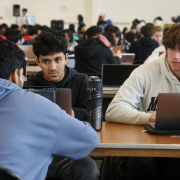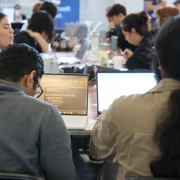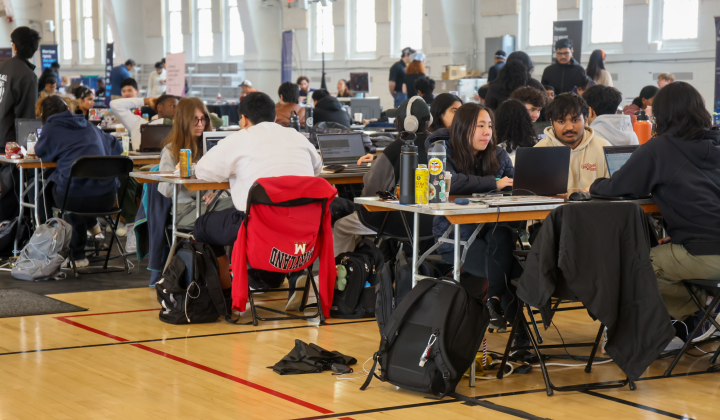Students Tackle Real-World Problems at Bitcamp’s 11th Hackathon
The University of Maryland hosted the 11th anniversary of Bitcamp, one of the East Coast’s largest collegiate hackathons, from April 11–13, 2025, at the Reckord Armory. Over 1,000 students from across the region, including 300 from outside the university, participated in the 36-hour event, which featured programming challenges, technical workshops and expert mentorship opportunities.
 Designed to be accessible to participants of all experience levels, Bitcamp provided a structured yet flexible space for students to collaborate, experiment and build software and hardware solutions. Attendees could work on projects independently or in teams, with access to mentors and technology resources throughout the weekend.
Designed to be accessible to participants of all experience levels, Bitcamp provided a structured yet flexible space for students to collaborate, experiment and build software and hardware solutions. Attendees could work on projects independently or in teams, with access to mentors and technology resources throughout the weekend.
Bitcamp 2025 offered five thematic tracks: general, machine learning, cybersecurity, quantum and app development. Highlights included workshops on extended reality development and UI/UX design, an alumni panel featuring Bitcamp founders offering career advice and Colorwar, a live drawing competition.
Computer science major Sharvari Tirodkar (B.S. '26, computer science; B.S. '26, operations management and business analytics) served as Bitcamp’s co-executive director. She emphasized the event’s commitment to accessibility and hands-on learning.
“Bitcamp is unique because we pride ourselves on being beginner-friendly,” Tirodkar said. “We're welcome to all hackers regardless of any technical experience. We just want to show hackers that even if they've never written a line of code in their lives, they're able to take away something from this weekend and build that into a tech career if they're interested in the space.”
The event’s 11th year marked a return for Bitcamp’s original founders, who helped launch the program in 2013. The current leadership remains focused on introducing students to emerging fields in technology and encouraging them to explore potential future careers.
“We host a series of tracks every year and those allow us to introduce hackers to these areas in tech and allow them to see if this is something that they're interested in exploring in the future,” she said.
Many participants approached Bitcamp without prior hackathon experience, including computer science major Thomas Schlinke (B.S. '27, computer science). For him, working with others made all the difference.
“I would say having a collaborative environment that prioritizes one singular goal of developing a project in a short time span allowed me to learn how it is to work together in a team for computer science, which I hadn't had a lot of experience with before,” Schlinke said. “It allowed me to learn new skills and new technologies to help enable the project I'm making.”
 Schlinke’s team worked on an AI-powered project aimed at moderating online debates.
Schlinke’s team worked on an AI-powered project aimed at moderating online debates.
“The AI will be taking the transcript from the audio, analyzing it and spotting potential fallacies or bad faith arguments,” Schlinke said. “It’s just trying to maintain a respectful but informative debate. Being at Bitcamp gives us the motivation and atmosphere to work on such projects without any hindrance, and that’s special.”
For Helena Tesfaye (B.S. '27, computer science), the hackathon was an opportunity to address a different kind of challenge: financial literacy among students. Tesfaye and her team created a gamified learning tool to help users engage with topics like credit, budgeting and investing in an interactive environment.
“I think what stemmed the idea for this was just the instability that we feel as college students, not knowing anything about money,” Tesfaye said. “A lot of things that come with financial struggles—there’s no pathway to learning it without you having to seek it out yourself. So it was just an idea to gamify the process, making it a fun way to learn it.”
She also had advice for students considering future hackathons.
“Honestly, just come,” Tesfaye said. “A lot of people don’t attend hackathons because they think, ‘I don’t even know how to code yet,’ or, ‘I don’t have any experience.’ The best thing you can do is show up. If nothing else, go to the workshops and learn something new.”
Bitcamp offered a range of educational sessions for participants at all levels, including introductory programming tutorials and advanced technical walkthroughs. Even students without formal experience had opportunities to experiment with languages, tools and frameworks, including those used in Tesfaye’s and Schlinke’s projects, such as React, Next.js and OpenAI’s API.
Tirodkar shared that the event also attracts high school students from nearby counties and school districts. She hopes that the experience motivates them to consider technical fields of study once they enter college.
“We’re really excited that these minors are able to learn from their Bitcamp experiences and choose to pursue computer science in college,” Tirodkar said. “I really hope participants realize they are able to get a lot out of this experience.”
Bitcamp’s open, educational format remains a key part of the UMD’s commitment to student-led innovation.
As Schlinke noted, the experience offered more than he expected.
“It's been a great opportunity to just explore new ideas and see what other people are building,” he said. “It’s helped me think about what I want to work on in the future and I suggest all students who haven't experienced Bitcamp to make an effort to try it out next year.”
—Story by Samuel Malede Zewdu, CS Communications
The Department welcomes comments, suggestions and corrections. Send email to editor [-at-] cs [dot] umd [dot] edu.
